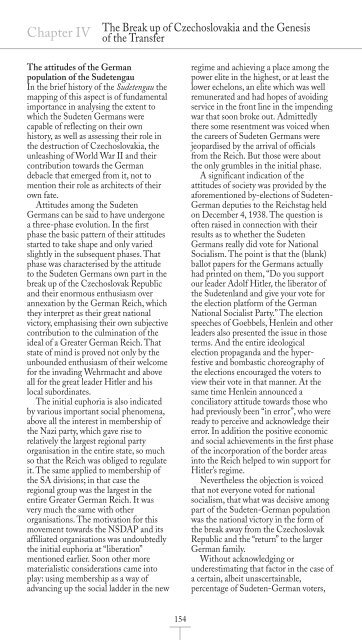the nationality of all inhabitants of the czech provinces and ...
the nationality of all inhabitants of the czech provinces and ...
the nationality of all inhabitants of the czech provinces and ...
You also want an ePaper? Increase the reach of your titles
YUMPU automatically turns print PDFs into web optimized ePapers that Google loves.
Chapter IV<br />
The attitudes <strong>of</strong> <strong>the</strong> German<br />
population <strong>of</strong> <strong>the</strong> Sudetengau<br />
In <strong>the</strong> brief history <strong>of</strong> <strong>the</strong> Sudetengau <strong>the</strong><br />
mapping <strong>of</strong> this aspect is <strong>of</strong> fundamental<br />
importance in analysing <strong>the</strong> extent to<br />
which <strong>the</strong> Sudeten Germans were<br />
capable <strong>of</strong> reflecting on <strong>the</strong>ir own<br />
history, as well as assessing <strong>the</strong>ir role in<br />
<strong>the</strong> destruction <strong>of</strong> Czechoslovakia, <strong>the</strong><br />
unleashing <strong>of</strong> World War II <strong>and</strong> <strong>the</strong>ir<br />
contribution towards <strong>the</strong> German<br />
debacle that emerged from it, not to<br />
mention <strong>the</strong>ir role as architects <strong>of</strong> <strong>the</strong>ir<br />
own fate.<br />
Attitudes among <strong>the</strong> Sudeten<br />
Germans can be said to have undergone<br />
a three-phase evolution. In <strong>the</strong> first<br />
phase <strong>the</strong> basic pattern <strong>of</strong> <strong>the</strong>ir attitudes<br />
started to take shape <strong>and</strong> only varied<br />
slightly in <strong>the</strong> subsequent phases. That<br />
phase was characterised by <strong>the</strong> attitude<br />
to <strong>the</strong> Sudeten Germans own part in <strong>the</strong><br />
break up <strong>of</strong> <strong>the</strong> Czechoslovak Republic<br />
<strong>and</strong> <strong>the</strong>ir enormous enthusiasm over<br />
annexation by <strong>the</strong> German Reich, which<br />
<strong>the</strong>y interpret as <strong>the</strong>ir great national<br />
victory, emphasising <strong>the</strong>ir own subjective<br />
contribution to <strong>the</strong> culmination <strong>of</strong> <strong>the</strong><br />
ideal <strong>of</strong> a Greater German Reich. That<br />
state <strong>of</strong> mind is proved not only by <strong>the</strong><br />
unbounded enthusiasm <strong>of</strong> <strong>the</strong>ir welcome<br />
for <strong>the</strong> invading Wehrmacht <strong>and</strong> above<br />
<strong>all</strong> for <strong>the</strong> great leader Hitler <strong>and</strong> his<br />
local subordinates.<br />
The initial euphoria is also indicated<br />
by various important social phenomena,<br />
above <strong>all</strong> <strong>the</strong> interest in membership <strong>of</strong><br />
<strong>the</strong> Nazi party, which gave rise to<br />
relatively <strong>the</strong> largest regional party<br />
organisation in <strong>the</strong> entire state, so much<br />
so that <strong>the</strong> Reich was obliged to regulate<br />
it. The same applied to membership <strong>of</strong><br />
<strong>the</strong> SA divisions; in that case <strong>the</strong><br />
regional group was <strong>the</strong> largest in <strong>the</strong><br />
entire Greater German Reich. It was<br />
very much <strong>the</strong> same with o<strong>the</strong>r<br />
organisations. The motivation for this<br />
movement towards <strong>the</strong> NSDAP <strong>and</strong> its<br />
affiliated organisations was undoubtedly<br />
<strong>the</strong> initial euphoria at “liberation”<br />
mentioned earlier. Soon o<strong>the</strong>r more<br />
materialistic considerations came into<br />
play: using membership as a way <strong>of</strong><br />
advancing up <strong>the</strong> social ladder in <strong>the</strong> new<br />
The Break up <strong>of</strong> Czechoslovakia <strong>and</strong> <strong>the</strong> Genesis<br />
<strong>of</strong> <strong>the</strong> Transfer<br />
154<br />
regime <strong>and</strong> achieving a place among <strong>the</strong><br />
power elite in <strong>the</strong> highest, or at least <strong>the</strong><br />
lower echelons, an elite which was well<br />
remunerated <strong>and</strong> had hopes <strong>of</strong> avoiding<br />
service in <strong>the</strong> front line in <strong>the</strong> impending<br />
war that soon broke out. Admittedly<br />
<strong>the</strong>re some resentment was voiced when<br />
<strong>the</strong> careers <strong>of</strong> Sudeten Germans were<br />
jeopardised by <strong>the</strong> arrival <strong>of</strong> <strong>of</strong>ficials<br />
from <strong>the</strong> Reich. But those were about<br />
<strong>the</strong> only grumbles in <strong>the</strong> initial phase.<br />
A significant indication <strong>of</strong> <strong>the</strong><br />
attitudes <strong>of</strong> society was provided by <strong>the</strong><br />
aforementioned by-elections <strong>of</strong> Sudeten-<br />
German deputies to <strong>the</strong> Reichstag held<br />
on December 4, 1938. The question is<br />
<strong>of</strong>ten raised in connection with <strong>the</strong>ir<br />
results as to whe<strong>the</strong>r <strong>the</strong> Sudeten<br />
Germans re<strong>all</strong>y did vote for National<br />
Socialism. The point is that <strong>the</strong> (blank)<br />
b<strong>all</strong>ot papers for <strong>the</strong> Germans actu<strong>all</strong>y<br />
had printed on <strong>the</strong>m, “Do you support<br />
our leader Adolf Hitler, <strong>the</strong> liberator <strong>of</strong><br />
<strong>the</strong> Sudetenl<strong>and</strong> <strong>and</strong> give your vote for<br />
<strong>the</strong> election platform <strong>of</strong> <strong>the</strong> German<br />
National Socialist Party.” The election<br />
speeches <strong>of</strong> Goebbels, Henlein <strong>and</strong> o<strong>the</strong>r<br />
leaders also presented <strong>the</strong> issue in those<br />
terms. And <strong>the</strong> entire ideological<br />
election propag<strong>and</strong>a <strong>and</strong> <strong>the</strong> hyperfestive<br />
<strong>and</strong> bombastic choreography <strong>of</strong><br />
<strong>the</strong> elections encouraged <strong>the</strong> voters to<br />
view <strong>the</strong>ir vote in that manner. At <strong>the</strong><br />
same time Henlein announced a<br />
conciliatory attitude towards those who<br />
had previously been “in error”, who were<br />
ready to perceive <strong>and</strong> acknowledge <strong>the</strong>ir<br />
error. In addition <strong>the</strong> positive economic<br />
<strong>and</strong> social achievements in <strong>the</strong> first phase<br />
<strong>of</strong> <strong>the</strong> incorporation <strong>of</strong> <strong>the</strong> border areas<br />
into <strong>the</strong> Reich helped to win support for<br />
Hitler’s regime.<br />
Never<strong>the</strong>less <strong>the</strong> objection is voiced<br />
that not everyone voted for national<br />
socialism, that what was decisive among<br />
part <strong>of</strong> <strong>the</strong> Sudeten-German population<br />
was <strong>the</strong> national victory in <strong>the</strong> form <strong>of</strong><br />
<strong>the</strong> break away from <strong>the</strong> Czechoslovak<br />
Republic <strong>and</strong> <strong>the</strong> “return” to <strong>the</strong> larger<br />
German family.<br />
Without acknowledging or<br />
underestimating that factor in <strong>the</strong> case <strong>of</strong><br />
a certain, albeit unascertainable,<br />
percentage <strong>of</strong> Sudeten-German voters,


